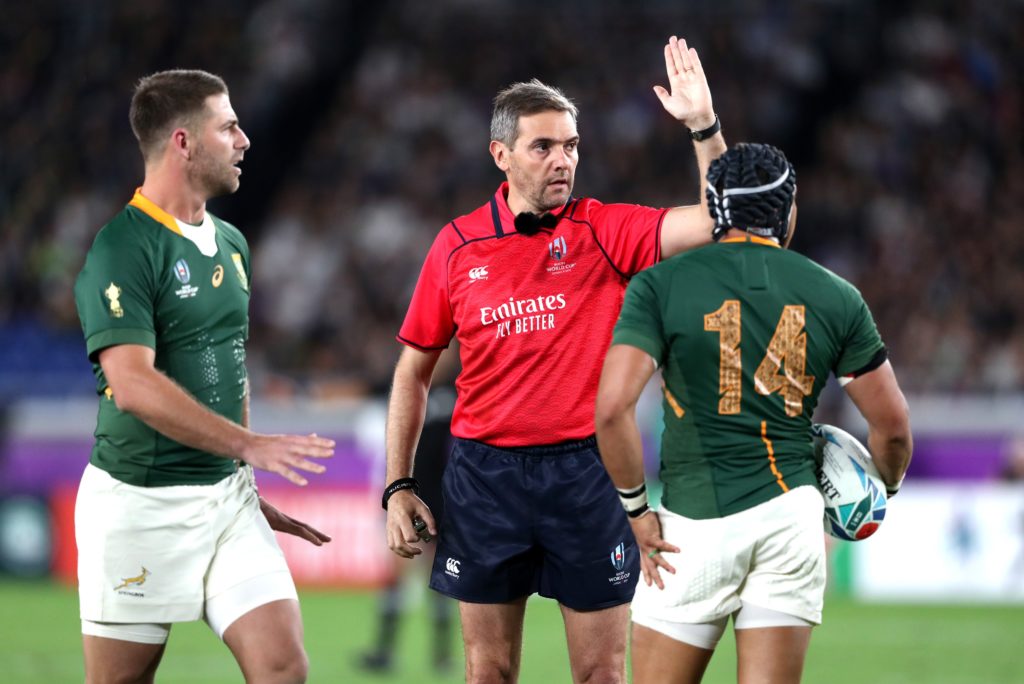Jerome Garces was not very good on Saturday, but the Springboks need to look a bit deeper than an inconsistent ref when addressing a game that was lost within a five-minute period, writes former Bok hooker JAMES DALTON.
South Africans always seem quick to cry poor over refereeing when it doesn’t go our way. While it was certainly some questionable officiating that denied us opportunities at times and conversely benefited the All Blacks, the whistle had nothing to do with our defensive line getting cut to pieces twice within five minutes and our inability to adjust to an All Blacks side that neutralised our basic structure.
Rassie Erasmus needs to be careful when commenting on the referee, because it detracts from some serious issues that need to be addressed with regard to the Springboks’ game plan. When the coach begins to look past basic errors and towards the ref, the players start to do the same, and so can begin a cycle of non-accountability.
Erasmus pointed to the skewed penalty count between the Boks and the All Blacks this past weekend as indicative of a refereeing performance. What it also indicated was the Boks’ inability to adapt to a breakdown situation where the All Blacks weren’t contesting the ball, and rather restructuring their defence.
On the topic of defence: we’ve raved this year about the Springboks rush defence, but the team seems to have forgotten that firstly this needs to be executed with an aim, and secondly you still need the ball to score points and win.
So often we were found kicking the ball away ineffectually, with no clear aim and no structured defensive net. The main culprit: Faf De Klerk, who aside from his poor kicking, played irresponsible rugby, rushing too often towards the centres, but not making any tackles and then leaving a huge hole in the second line of defence, where the scrumhalf should usually be roaming.
De Klerk’s service was also sluggish and didn’t help an attacking cause facing an All Blacks defence that was consistently ready due to their lack of contesting at the breakdown.
Makazole Mapimpi, in my opinion, continues to be a concern on defence. His ball watching disrupts the rush defence tactic, because he’s caught so often with his shoulder to the touchline, scrambling towards the outside and unable to recover to make the tackle due to his line speed.
When the Springboks get their rush defence right it works fantastically well, but all players need to execute it and communicate efficiently.
The All Blacks, aside from simply being clever at ruck time, completely neutralised one of our main strengths – in our lineout and maul, sacking it and preventing quick ball off a base of momentum. Again, we were found forcing this tactic that continued to not work, rather than trying to readjust.
The Boks on Saturday were not bad. Before the game, I felt they were going to win, and after the first 20 minutes, I think that the All Blacks felt the same way.
But following the two quick tries, the Springboks were unable to shift the momentum back their way. Through seemingly refusing to readjust certain strategies to suit the game, and persisting with ones that the All Blacks continued to counter fairly comfortably, they just couldn’t.
The Boks remain the strongest side in this World Cup outside the All Blacks in my opinion, but their game plan, strategy and execution need to be more intuitive and adjustable if they hope to bring home the cup.
Photo: Mike Hewitt/Getty Images





